Victimhood Culture Gets Them When They’re Young: Why Are Young Progressive Women So Depressed?
'Pink Tax' edition

It’s a tough time to be growing up as a young woman.
Often it can be even tougher to grow up as a young progressive woman. But part of the reason it’s so tough is that, in some important ways, their lives aren’t as tough as they think they are. Confused?
Let’s take a step back.

Many Things Are Getting Better
Generations of Americans, including my own, have been spared from high-casualty warfare. Rates of violent crime remain much lower than they were in the 80s and early 90s. In the U.S., many terrible diseases, such as tuberculosis and polio, have all but vanished, and today we all enjoy life-saving advances that weren't available even to the world’s elite just a century ago.
Calvin Coolidge’s son died after a blister he developed playing tennis on White House grounds became infected. Penicillin would have saved his life.
Such positive developments benefit males and females, so what’s going on with young women, especially young progressive women?
After all, that group is especially likely to suffer from depression or anxiety.

Gallup reveals that women’s satisfaction with how they’re being treated in American society has fallen in recent years, and an American Survey Center analysis discovered that different groups of women react very differently when asked to weigh in on that issue. Only 32 percent of young liberal women report being satisfied with how they fare in American society. But for young conservative women, the figure rises to 70 percent.
One author of the analysis notes that women’s views on the current state of gender equality are closely connected with how they think about their own lives:
Young liberal women who are unhappy about the way women are treated feel much more pessimistic. This connection is not evident among young conservative women or older women.
Part of the problem is that parents, schools, and media outlets often fail to teach young people, including young women, the whole picture.
Our 60% off sale ends next Friday. Help push back against victimhood culture. Why not consider becoming a paid subscriber today?
Some things have gotten worse, but other things have gotten better. Knowing some history helps us resist the common temptation to assume we live in uniquely awful times. Covid was bad, but it was nothing like the Black Death.
Another part of the problem addresses young women more directly. The rise of social media in the 2010s hurt girls and young women more than it hurt boys and young men, who were more likely to be obsessed with video games than comparing themselves with their peers on Instagram.
Today our culture is finally eager to discuss the ill effects of social media, but even that doesn’t get us all the way to our question. Social media can help us understand some of the troubles young women face today, but what about young, progressive women?
Part of the problem reveals itself in attempts to highlight threats specific to women, threats like sexism. Of course, we must take care to recognize sexism, and many social incentives help ensure we don’t understate it. But like peoples’ lives in general, the lives of young women remain a mixed bag. And some things have gotten better. It may be uncomfortable to say it out loud, but overstating sexism can be just as harmful as understating it.
Young progressive women are especially likely to keep sexism in the forefront of their minds. Stories of sexism fill their social media feeds, as well as the podcasts, shows, and media they consume. On campus, administrators and professors continue to highlight sexism.
The higher ed monoculture rarely allows for the kind of viewpoint diversity that would challenge the sacred belief that American culture is fundamentally sexist. If you believe a pernicious systemic force will undermine you no matter how hard you work, you will be more likely to slip into misery.
But our narrow-minded monoculture doesn’t begin in college.
It begins much earlier and can be found in countless places, including educational podcasts for kids.
RELATED
Welcome to My Social Justice High School: The bad advice adults gave me
Trauma Everywhere: How Schools' Mental Health Programs Promote Fragility
When Overstating Sexism Hurts Women: What accounts for gender disparities in STEM?
Olivia Wilde: Women Are Taught to Apologize for Their Existence: Is sexism the main reason why there aren't more female film directors?
The Wide End of the Funnel
My 10-year-old son devours podcasts, especially offerings from American Public Media such as Million Bazillion, a podcast about money “that helps dollars make more sense.” It’s one of his favorites—and mine.
For years, he’s listened to episodes over and over on his own. And while driving together, I’ve probably heard almost every episode at least once. The podcast mixes captivating storytelling with humor in a way that makes learning a pleasure for kids.
And yes, being an APM production, you will be unsurprised to learn that the show’s worldview leans left. It’s often not a big deal. Sometimes the bias ranges between faint and imperceptible, but other times the dogmatism becomes a bit much.
Consider the episode about the pink tax. Here’s the cold opener:
JED: Hmmm. Hmmm. Hmmm.
BRIDGET: Hey Jed, what’cha doing?
JED: Oh, hey. I’m trying to figure out what’s different about these jump ropes. They seem exactly the same...except for the color. One of them is pink. One is blue.
BRIDGET: Oh, I didn’t know you were in the market for a jump rope!
JED: Well I really wanted the pink jump rope but it’s slightly more expensive than the blue one. So I know it’s probably more responsible if I buy the cheaper one...but I really like the pink one. Why does that one have to cost more?
Sidebar: Of course, the male co-host is interested in the pink product. My son and I always chuckle at APM’s efforts to correct societal wrongthink. If the episode is about gladiators, it will feature a girl co-host. If they’re talking unicorns, it’s time to bring in a boy.
OK, back to the pink tax.
A young listener poses a question to the hosts:
ISABELLA: I’m Isabella and I come from California. And my question is, why are women’s accessories or attire so much more expensive than men’s?
BRIDGET: So Jed, I think you and I both agree on why we HAD to answer this question for today’s show.
JED: Yep. I heard this was a thing years ago. But I totally thought we’d fixed it! I had no idea that it’s STILL happening.
BRIDGET: Exactly. I was shocked. And Isabella wasn’t happy when she first figured this out either:
ISABELLA: Well I visited some websites and I saw that some women’s clothing were more expensive than men’s clothing. I thought it was unfair.
BRIDGET: It seems TOTALLY unfair!
The hosts explain that the pink tax isn’t an official tax like a sales tax. Rather, “the phrase ‘pink tax’ is just a way we describe the extra money that companies sometimes charge for products they think women will buy.”
Bridget and Jed zero in on some examples — bike helmets and polo shirts — where the “girl” version costs more than the “boy” version. When it comes to another example (ballpoint pens), the girl version cost twice as much as the boy version.
The pink tax can really add up, so you can see why girls and women would be upset.
The show turns to a “topically appropriate” punk rock song (with young, female vocals) to help co-host Bridget express her angst:
You say you want me to pay. MORE!
That’s why I’ll kick down your dumb DOOR!
Bury my axe in your pink tax. SCORE!
Then we’ll see who’s gonna feel MORE!
Never never gonna never gonna gonna pay!
Never never gonna never gonna gonna pay!
Never never gonna never gonna gonna pay! WHOO!
OK, now that listeners are sufficiently fired up, it might be a good time to examine why some girl things cost more than some boy things.
Sexism is one possible explanation, but maybe there are others.
This is where things get weird.




